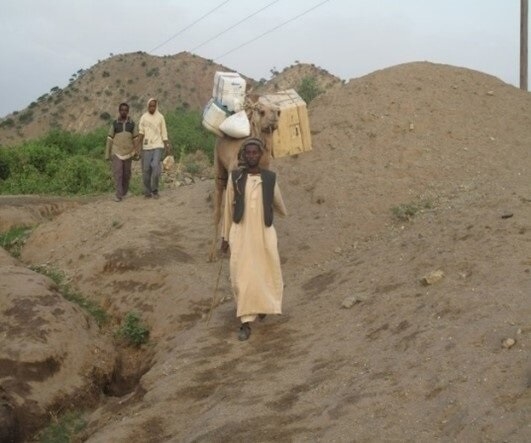REPORT 2022 - 2023
Epigraph:
Author:
- Home
- Executive overview
- Working together
- Impact on the Ground
WHO Region:Country, Territory or Area:Filter search results




- Countries enabled to provide high-quality, people-centred health services, based on primary health care strategies and comprehensive essential service packages
Improving access to immunization in hard-to-reach areas of Eritrea
Despite Eritrea's generally strong performance in immunization, four out of its six administrative regions, known as Zobas, recorded immunization rates below 60% in 2022 and before. In these Zobas - which are primarily located in the country's Eastern and Western lowlands - rural, nomadic, and seasonally mobile communities experience significant obstacles to accessing routine immunization services. To tackle this issue, Integrated Sustainable Outreach Services (SOSs) were implemented to improve routine vaccination coverage among children under two years old and women of childbearing age. By December 2022 over 92% of caregivers had received health education and most zero-dose and under-immunized children, along with mothers of reproductive age, had been reached with vaccinations: Among children under two years, vaccination coverage rates were high with Penta, OPV, IPV, Rota, and PCV-13 vaccines at 95%, and coverage rates for measles and rubella vaccines at 92% and 89%, respectively. In addition, 95% of both pregnant and non-pregnant women had received essential Tetanus diphtheria (Td) vaccinations.
WHO's Key Contributions
- Collaborated with the Ministry of Health (MoH) to identify target outreach areas in Eritrea.
- Advocated to mobilize resources from partners and directly covered all operational costs for the four rounds of the campaign.
- Provided technical support and essential tools for macroplanning, microplanning, and trainings.
- Co-led consensus-building meetings with the Ministry of Health.
- Conducted routine structured monitoring and post-campaign reviews.
How did Eritrea, with the support of WHO, achieve this?
Initial planning and work plan development were jointly conducted by WHO and the Ministry of Health (MoH) in January 2022. Given the lack of a comprehensive population census and civil registration and vital statistics system in Eritrea, a 2020 equity assessment, and an Expanded Programme on Immunization (EPI) coverage survey were used to identify target areas for outreach services.

Community members carry vaccines and other supplies to an outreach immunization
session in Zoba Anseba, Gash Barka, Eritrea in March 2022.
Photo credit: WHO Eritrea
The assessment indicated that eighteen of Eritrea's 58 districts presented physical barriers such as rocky and mountainous terrain, which hindered healthcare access and complicated the delivery of routine immunization. To tackle this, WHO Eritrea worked with the MoH, partners, civil society organizations, and local management teams to formulate a comprehensive macro plan and training plan, complete with a budget. This groundwork enabled WHO to garner financial and logistical support from stakeholders. GAVI, the Vaccine Alliance, covered the vaccine costs and vaccines were procured via United Nations Children’s Fund’s (UNICEF's) supply division. WHO directly funded operational costs including accommodation, training, daily allowances, and transportation.
Meetings led by WHO and MoH EPI managers fostered consensus among health directors and managers. The WHO contributed not only technical support for the creation of management protocols and standards for outreach immunization services but also supplied crucial planning tools across all districts. Following this, the district task force took charge of implementation and actively collaborated with community and religious leaders to garner their support.
WHO Technical officers were assigned for close monitoring and evaluation. Field guides, reporting tools, and supervisory checklists were prepared by WHO and the MoH at the national level and distributed to all Zobas.
Finally, four rounds of outreach immunization services were conducted between February and May 2022 in the 18 targeted districts. In each round 18 rental vehicles, 32 camels, 90 vaccinators, and 216 community volunteers and supervisors were deployed. Local community volunteers assisted health workers in carrying vaccines and supplies and guided them during outreach visits to recommended villages. Health education sessions were held to raise vaccine awareness.
In total, 42 907 children and 152 054 mothers were vaccinated against EPI target diseases, and health education was provided. Monitoring and post-campaign reviews showed a significant uptick in vaccination rates, attributed to community involvement, political commitment, early planning, and dedicated health workers. Recommendations for future initiatives include the continuation of outreach services, integration of other health services, and detailed mapping. Having garnered the support of partners, committed health workers, community volunteers, and local government, the outreach program has laid a strong foundation for future efforts.
- Countries enabled to provide high-quality, people-centred health services, based on primary health care strategies and comprehensive essential service packages
